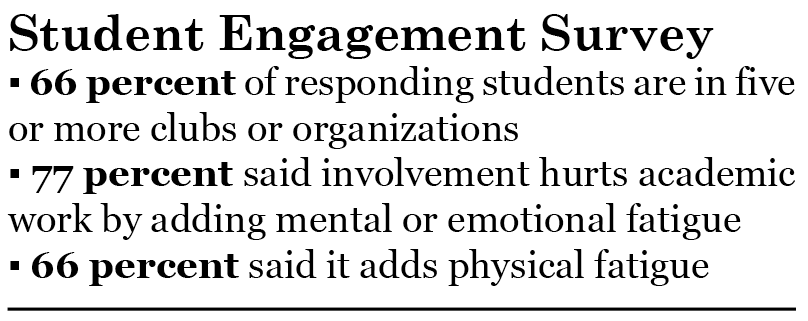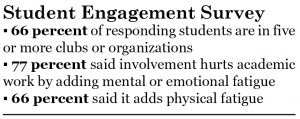We now have numbers to concretely describe Ohio Wesleyan’s often ephemeral over-involvement problem.
Sixty-six percent of OWU’s students are involved in at least five clubs or organizations, a Student Involvement Office survey found. This means it’s most likely that an OWU student — at least one of the 490 who responded — has more extracurricular than academic commitments.
They’re also tired. Seventy-seven percent said their involvement “detracts from academic work” by adding mental or emotional fatigue; 66 percent said it made them more physically fatigued; and 77 percent said it “overextended (their) responsibilities.
This doesn’t surprise me. It’s only the second week of the academic year, so few of us are yet traversing campus with glazed faces, exhausted bodies and overworked minds. But in a few weeks, the truth these numbers tell will start to manifest itself.
On one hand, it’s easy to view these numbers with frightened awe and pessimism. But they come at an advantageous time.
Now that we have a better sense of how many all-nighters students pull in a given week, we can work proactively to create a healthier, happier campus.
To do that, I first want to ask some questions the survey didn’t. Do the students in that 66 percent feel their involvement in five or more clubs is healthy? What does it give them? What does it take away?
Instead of asking what limited students’ participation in extracurricular activities, as the survey did, why not ask what obstacles it creates in other parts of our lives. The most common response was academic workload (86 percent). Is it really that school inhibits involvement, or is it the reverse?
Answering these important questions would, I think, help inform how OWU’s administrators and we students will work to assuage this problem. But I think there are things to do before those answers come.
One would be to use next Saturday’s GO!OWU workshop as an opportunity for highly involved students to talk meaningfully with university decision-makers and each other about over-involvement.
Whether in a formal breakout session or informal breakfast chats, this would at least publicly acknowledge that there is a cultural expectation that OWU students do everything all the time. Hopefully, it would lead to some idea-sharing about how to care for ourselves and each other in our extracurricular lives.
Second, as students, we can evaluate our lists of commitments and ask ourselves whether each one helps or hurts us.
I am one of the 66 percent, and it’s a goal of mine to only make commitments I know I can keep, and to say no without fear or shame. Regret that I can’t help someone or that I’ll miss out on a great opportunity, sure; but no fear or shame. Not for any of us.
Ultimately, though, this isn’t solely our responsibiity. I maintain what I wrote in March about over-involvement — that I want Student Affairs administrators to acknowledge the problem and that taking care of oneself is as important as the sum of one’s extracurricular activities, which they have yet to do.
As upperclassmen looked at their schedules and saw trouble ahead, the Student Involvement Office put on a club fair, offering first-year students sign-up lists with no word of caution about taking on too much too fast. For every club fair, I want see a workshop or flyer about self-care rather than nothing.
Perhaps response bias plays a role — it’s possible that only the most overextended students took the survey. But experience tells me these are broader trends, and I want to see administrators take that into account.
I got more positive feedback and thanks from my fellow students on my March column than anything else I’ve written. It seemed to resonate with my peers’ experience. I heard nothing — not even a refutation — from any administrator.
Meanwhile, Dean of Students Kimberlie Goldsberry presented the 66 percent statistic as something exciting in my RA training last month. I want to see these key administrators take this problem head on, not ignore it or talk about it as if it is not a problem.
On a positive note, 86 percent of the engagement survey’s respondents said they think involvement has post-grad benefits. I want to see a concerted campus-wide effort to ensure those benefits don’t cost us our mental and emotional health.

